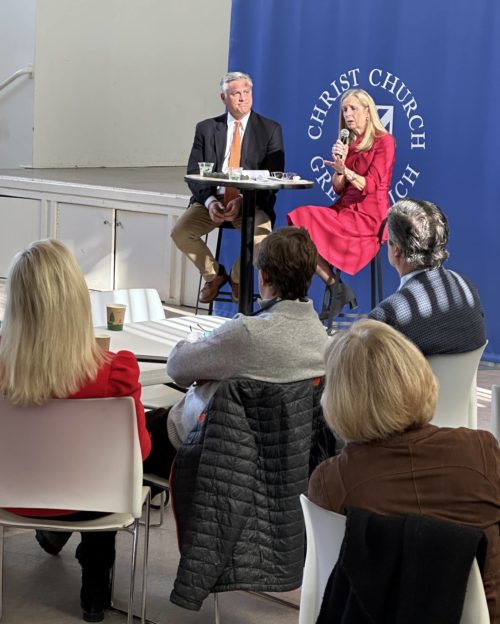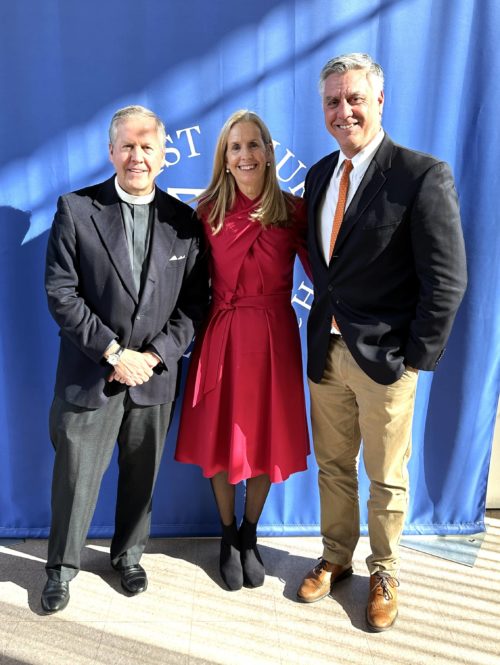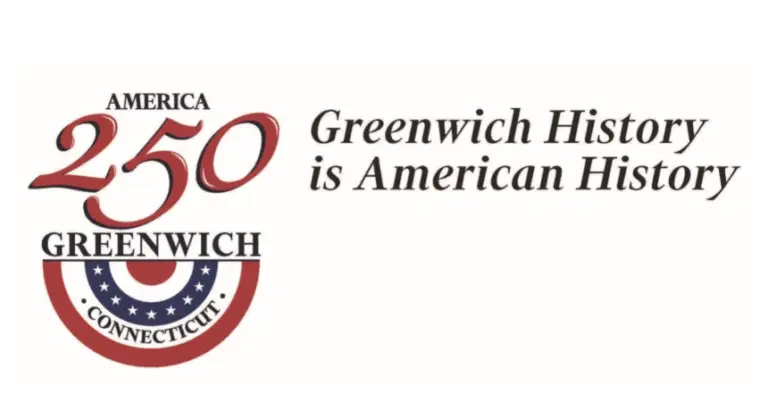Two Greenwich educators share importance of character building at Christ Church Forum
By Anne W. Semmes
The experience of two leading educators, Molly King, Head of School of Greenwich Academy (GA), and Adam Rohdie, Head of School of Greenwich Country Day School (GCDS), was on stage last Sunday as the two addressed: “Learning and Leading – Raising Children of Outstanding Character” before some 140 present at the Sunday morning Forum at Christ Church Greenwich. (With an additional 107 on livestream.)
The occasion was marked by the news of King’s retirement next year as Head of School after 19 years, with Rohdie, also having served 19 years as Head of School, offering to be interviewer.
Rohdie began by sharing a statistic learned when the two of them attended a recent educational meeting, “which was just 10 years ago, the average tenure for a head of school in an independent school was 9.9 years. Ten years later, it stands at just under five years… And these can be fairly lonely jobs, they can be massively difficult jobs at times. And to be able to pick up the phone and say [to Molly], “I’ve got this going on at my place…”
“So, Molly,” he asked, addressing the topic of raising children of outstanding character, “In the last two decades, what are two or three of the biggest changes that you’ve seen that probably impact that area?” Social media was her answer. “What makes it fairly unique in this arena of raising children and then educating them,” King said, “is that it is largely a world without adult engagement or supervision, so it is a bit of a standalone.” She cited the impact of social media on children’s “identity development,” and on its “consequential impact on all of us.”
And how Rohdie asked was GA addressing that impact? “It’s different for the different ages,” told King. “We are explicit around the message to parents, ‘Delay, delay, delay.’ Be really mindful of knowing when your child claims, and I emphasize claims, that they need a phone in their hand, that they need access…So, in the lower school, it’s really ‘Delay, delay, delay.’ In the middle school, we talk about your digital compass, your digital identity, how are you managing that? And then in the upper school, it’s really about giving agencies to the students themselves, because they are truly the experts and they don’t want to be tech addicts…to be so susceptible to what this space says about them, their self-esteem, their values.”
Rodie interjected: “We’re giving these children these incredibly powerful tools at a time when they haven’t had the fully formed frontal lobe, and then that leads to a lot of problems.” He conjectured that in this year “75 percent of disciplinary issues” would emanate from the social media world.
“And obviously we have license to say,” King added, “You shouldn’t be using your phones, they’re not allowed in these spaces. And I say this with empathy, not judgment. I say this both as a parent and now as a grandparent, that you hear empathy, not judgment, because this is a hard time to raise children and we have a lot of empathy around this topic.”
But then character building took center stage. What programs did GA have, asked Rohdie, that helped lead “to growing kids of character?” King described a “robotics program, we have now for all three divisions, lower, middle and upper school, and they compete in competitions against other schools.” Observing a student competing against other bots, with the clock ticking, “It looked anxiety provoking,” she told. “But the student appeared “very calm, which was the important thing.” The student explained the action in the competition. “That sounds reasonably simple,” she responded. “No, no, no, Mrs. King,” said the student. “That team over there has a better bot than ours. And about 30 things are going to go wrong in the first minute. And we are going to have to be completely nimble and figure it out. We are going to fail, fail, fail.” “And I love that she used that word,” said King. “Because when you’re talking about character, what are the moments that you learned the most from? It wasn’t the things that came easily to you. It’s when we had to face challenges. And so, we know how important resilience is, how much that correlates to character. And that’s what I was hearing in that moment, “Fail, fail, figure it out, fail some more, succeed.”
Also character building told King were those older-younger sibling relationships “and how powerful those are,” she said. “We embed that in our community service program, whether it’s big sister, little sister programs, or this fall we have upper schoolers supervising middle school homework hall,,.and homework helpers helping out in the Cowan Center, our early childhood learning center. So, I think promoting those ideals that all of you hold near and dear, as parents and grandparents, is so natural.”
“I’m also hearing,” said Rohdie, “as you’re talking of Stanford professor Carol Dweck’s work – her thesis that there are two mindsets, a fixed mindset and a growth mindset. We want to encourage a growth mindset in children. So, when your child comes home with that A on an algebra test and you say, ‘You are so smart, high five,’ it creates a feeling like, ‘You’re smart, that’s why you did well.’ The flip of that is to say, ‘Way to go. I know how hard you worked. Great effort.’ When we praise the effort versus the outcome, we start to create a growth mindset in children. That’s what a lot of these programs, your community service, your robotics program, you’re pushing people into that growth mindset.”
When it comes to college admission King sees “the immediacy of that topic intensifying everything.” “Do you think parents are expecting GA to provide Harvard, Princeton, Yale,” asked Rohdie, “and anything else gets in the way of that?”
“I would say that on the empathy side of things,” said King, “One has to recognize that the baseline of anxiety and fear for parents is higher…If you are specifying an outcome, what is the message then to one’s child? “Rather, she suggested, “back off of that and say, ‘I believe in my child… I believe in their capacity to forge their own paths.”
Rohdie added a telling story of a friend and former Head of School of the Choate School, who would address the new parents of ninth graders “on day one” with a question of choice. “Choice One: I will get your kid into Harvard, Princeton, or Yale. Or choice two, at the end of four years, you’re going to have a well-adjusted, healthy, normal, mature adult, great roommate. And of course, all the parents put their hand up for the second choice.” And then that brilliant part. “Now, children turn and look at your parents. They have their hands up saying that they want you to be normally well adjusted, healthy kids. Remind them of that because they’re going to lose their minds when you’re a junior.”
To further confirm that value of building character, Rohdie shared a story dating from when GCDS announced it was adding on a high school. He’d immediately driven up to his alma mater, Wesleyan University, met with the president of the college and asked him, “Tell me what you’re going to look for in a high school graduate who would go to your college?” The president he learned had just met with presidents of other New England small liberal colleges in which the discussion was the “increases in anxiety, depression, suicidal ideation, drug abuse, alcohol” amongst students. “Adam,” he was addressed, “If you could send us kids who are going to be good roommates, good classmates, kids who can self-advocate, kids who will be mature, kids who will make mature decisions, kids who can articulate a point of view and are not going to fall apart when the teacher says, ‘I don’t agree with your point of view.’ They’re not going to smash a teacup. Or they’re not completely burnt out from the entire time that they’ve spent in their high school to just get into college.” Hearing that was revelatory to Rohdie. Could he “create a high school experience which produces kids of high character?”






